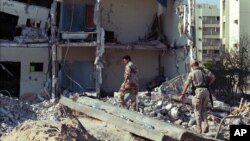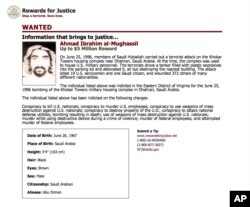The man suspected of devising the truck bombing that killed 19 U.S. Air Force personnel in Saudi Arabia nearly 20 years ago has been arrested, the pan-Arab daily newspaper Asharq al-Awsat has reported.
Quoting an unnamed Saudi official, the Saudi-owned news organization identified the suspect as 48-year-old Ahmed al-Mughassil, who was arrested in Beirut, Lebanon, and repatriated to Saudi Arabia. The official said the operation was coordinated with what he called "concerned bodies." He didn't elaborate on whether Lebanese officials had any role in Mughassil's apprehension.
The Saudi publication said Mughassil is believed to lead the Iran-allied Hezbollah al-Hejaz Shi’ite militant group, which was implicated in the bombing June 25, 1996, of the eight-story Khobar Towers apartment complex near the eastern city of Dhahran. More than 300 others were wounded in the attack on the complex, which housed American Air Force personnel.
The U.S. Federal Bureau of Investigation (FBI), which placed Mughassil on its most-wanted terrorist list, had offered a $5 million reward for information leading to his arrest.
A senior U.S. official in Washington who was briefed on the reported arrest Wednesday said American authorities were awaiting additional details, The New York Times reported. The official expressed confidence that the Khobar Towers attack's mastermind was no longer at large.
U.S. State Department spokesman John Kirby on Wednesday reminded that the attack "killed 19 servicemen and one Saudi citizen, wounded 372 other people." He said the United States supports the victims and their families and would "continue working with Saudi Arabia and the international community to bring to justice all the perpetrators of it."
A U.S. federal judge in 2006 had concluded Iran was responsible for the attack – a charge Tehran has denied – and ordered its government to pay the families of 17 victims a total of $254 million.
Kirby declined to discuss any possible extradition request of the suspect or Iranian involvement in the attack.
A 2001 U.S. indictment named Mughassil as head of the military wing of Hezbollah al-Hejaz and said he recruited other Saudi Shi'ites to join. It said that al-Hejaz took direction from Iranian military officers and that Lebanese-based Hezbollah members helped construct the truck bomb.
Arrest may bring answers
James Jeffries, a former U.S. ambassador to Iraq and now a distinguished fellow at the Washington Institute for Near East Policy, was posted to Kuwait at the time of the bombing.
"There is a very strong, direct red line leading from the rubble of al-Khobar to Tehran, and this guy might shed light on it because, from everything I’ve seen about him, he has a very deep relationship with Iran, with the Revolutionary Guards. And, that is my understanding from one who was in the region when that attack occurred and was trying to protect his post in Kuwait from a similar attack," said Jeffries.
Jeffries added that ironically the Air Force personnel killed were there as part of a mission to protect Iraq’s Shi’ite population from the deprivations of dictator Saddam Hussein, but Iran still wanted the U.S. out of the region. The former diplomat said that depending on how the Obama Administration reacts, this arrest could have an impact on the pending congressional vote next month on the nuclear agreement with Iran.










